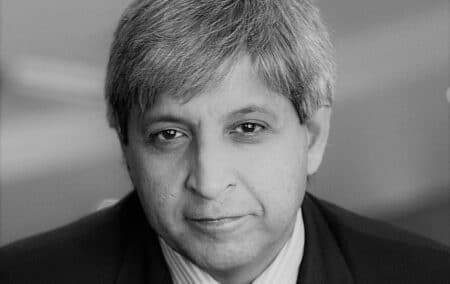It is doubtful that Adam Habib has done himself any favours by departing from his spirited defence of intellectual dispassion at the start of the row over his statement in a webinar that ‘If someone used the word “nigger” against another staff member, then it would violate our policy & action would be taken’.
You would have thought that defending intellectual rigour was naturally a central preoccupation of the newly appointed director of the School of Oriental and African Studies (SOAS) at the University of London.
But Habib has since replaced his unreserved defence – ‘You cannot impute maligned intention without understanding context’ – with an ‘unreserved apology’.
The effect is, unfortunately, a capitulation to unreason and fear.
Habib, in fact, warned as much in his first mostly creditable response, when, in a series of tweets, he began by saying: ‘Do I believe that only blacks can verbalize the word. No, I don’t.’ and went on to argue why:
‘I think the way this [identitarian] politics manifests through its targeting of individuals and labeling has the effect of silencing people. Daily people complain about how self appointed activists determine what is acceptable or not and how intolerant they are of alternative views. This is particularly destructive in a university which is meant to enable competing ideas.’
To be honest, he weakened the force of his argument by adding, contradictorily: ‘But it also creates a fertile ground for political forces on the right to mobilize on as we have seen when conservative political actors demand academic freedom and the right to speak.’
And the irony, of course, is that, far from ‘political forces on the right’ posing any meaningful threat to the pursuit of truth and light, the much more serious threat comes from zealots who call themselves ‘progressive’ and have succeeded in ‘persuading’ Adam Habib to, in effect, pipe down.
Hence, his accepting his suspension as SOAS director pending an inquiry (into what, one might well might ask?), and his saying: ‘I want to apologise unreservedly … I do now recognise the hurt and distress that has been caused and will continue to listen.’
‘Keep on learning’
His task was set out in a statement by Marie Staunton, chair of the SOAS Board of Trustees: ‘Adam has reaffirmed to us that he will focus his time listening to Black colleagues and students, to help to educate himself, and to keep on learning.’
Presumably, in case he missed it the first time, what he has agreed to listen to more carefully is the argument advanced against him with surely admirable clarity by the most vocal student critic in the controversial webinar.
This young man told Habib: ‘I am sorry, you are not a black man; you cannot use that word. You have not faced the trauma and oppression of black bodies, what we go through 24/7 for the past 500 years (sic). You do not embody our history, so therefore you cannot use the word.’ Black people, this black British student said, reserved the right to use the word in the name of ‘autonomy, agency and the reclamation of our own history’.
This has all the appearance of a power kick – and I get that, in a way.
For people who have been abused for centuries because of what they look like, here’s one way of getting level. And there are, indeed, interesting questions worth exploring about the role of language in nurturing an atmosphere of abuse or in nurturing resistance to it.
Yet it surely is a most remarkably puny thing if the only intellectual gesture at your disposal is to compel an interlocutor to apologise for using a noun on the grounds not that, as the Oxford Dictionary tells us, it is ‘usually derogatory and considered racially offensive’, but that it may be spoken only by people against whom it was once routinely, and is still occasionally, used by bigots.
Having breached this arbitrary rule, Habib – as Staunton expressed it in her statement – ‘recognises the significant impact which this has had on SOAS as a community and an institution and we know he is committed to taking all steps he can to address this with colleagues’.
‘Recognising the pain’
The Trustees, she said, ‘take these concerns … extremely seriously’. So seriously, in fact, that they had ‘spent the last few days talking and listening to different members of the SOAS community’, and, ‘(having) concluded the first round of listening, the Board will now take forward a series of actions in response, recognising the pain caused to many in the community’.
Where this leaves SOAS is anybody’s guess.
Founded in 1916 as the School of Oriental Studies, and having taken its present title in 1938, by which time it had also established itself as a centre for African Studies, SOAS esteems itself as ‘the leading Higher Education institution in Europe specialising in the study of Asia, Africa and the Near and Middle East’.
It sees itself as ‘a remarkable institution’.
With a ‘vast repository of knowledge and expertise on our specialist regions, we are uniquely placed to inform and shape current thinking about the economic, political, cultural, security and religious challenges of our world’.
SOAS scholars, it professes, ‘grapple with the pressing issues confronting two-thirds of humankind today: democracy, development, economy, finance, public and corporate policy, human rights, migration, identity, legal systems, poverty, religion, and social change.’
It is doubtless all very impressive.
What is less certain is that any of this will be advanced in the slightest by listening to or learning from activists who are evidently blind to the truth that no great flourishing of human endeavour was ever attained by policing a noun.
For a while, it seemed Adam Habib would be the man who might have taught them that. But the opportunity now appears to be lost.
[Image: The University of the Witwatersrand, https://en.wikipedia.org/w/index.php?curid=61288521]
If you like what you have just read, support the Daily Friend

